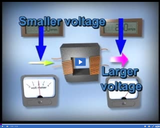
In a step up transformer a smaller amount of voltage enters the primary coil, and a larger amount of voltage leaves the secondary coil.
- Subject:
- Science
- Provider:
- Utah Education Network
- Author:
- Visual Learning Company
- Date Added:
- 02/28/2010

In a step up transformer a smaller amount of voltage enters the primary coil, and a larger amount of voltage leaves the secondary coil.
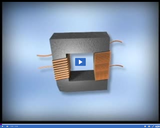
A transformer is composed of two coils of wire - a primary coil and a secondary coil. The coils are wrapped around a metal structure. When an alternating current enters the primary coil, a magnetic field is created.

This book contains eight chapters. Chapter Two briefly describes the technology that makes electronic commerce possible, while Chapter Three introduces the topic of Web strategy. The major functions of marketing are described in the next five chapters: Promotion (Chapter Four); Promotion and Purchase (Chapter Five); Distribution (Chapter Six); Service (Chapter Seven); and Pricing (Chapter Eight). The final chapter takes a broader, societal perspective and discusses the influence of electronic commerce on society.

In this animation produced by WGBH and Digizyme, Inc., see how molecules of DNA are separated using gel electrophoresis, and how this process enables scientists to compare the molecular variations of two or more DNA samples.

This activity from the Exploratorium provides instructions to build an electroscope, a device that detects electrical charge. Common, inexpensive materials including film canisters, 3-M Scotch Magic™ Tape, and a plastic comb are used to show the attractions and repulsions between positively and negatively charged objects. The site also provides an explanation of the results and suggestions for extension activities.

Gilder Lehrman Institute of American History provides elementary lesson plans, student activity sheets and professional development for teachers centered on American History. This unit is focused on the US Constitution.
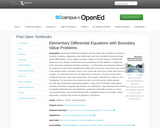
Elementary Differential Equations with Boundary Value Problems is written for students in science, engineering, and mathematics who have completed calculus through partial differentiation. If your syllabus includes Chapter 10 (Linear Systems of Differential Equations), your students should have some preparation in linear algebra. In writing this book I have been guided by the these principles: An elementary text should be written so the student can read it with comprehension without too much pain. I have tried to put myself in the students place, and have chosen to err on the side of too much detail rather than not enough. An elementary text cant be better than its exercises. This text includes 2041 numbered exercises, many with several parts. They range in difficulty from routine to very challenging. An elementary text should be written in an informal but mathematically accurate way, illustrated by appropriate graphics. I have tried to formulate mathematical concepts succinctly in language that students can understand. I have minimized the number of explicitly stated theorems and defonitions, preferring to deal with concepts in a more conversational way, copiously illustrated by 299 completely worked out examples. Where appropriate, concepts and results are depicted in 188 figures

In this activity, students will record a list of things they already know about hummingbirds and a list of things they would like to learn about hummingbirds. Then they will conduct research to find answers to their questions. Using their new knowledge, each student will make a hummingbird out of art supplies. Finally, using their hummingbirds as props, the students will play charades to test each other in their knowledge of the ruby-throated hummingbirds. The purpose of this activity is to provide students with information on ruby-throated hummingbirds, provide students with the opportunity to conduct research on hummingbirds in topic areas that interest them, and to provide students with opportunities to share their knowledge with other students. By completing this activity, students will gain knowledge about ruby-throated hummingbirds. They will also gain experience researching a topic of their choosing related to hummingbirds and communicating those results in several different formats.
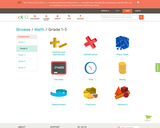
Ck-12's Grade 2 Elementary Math is a series of videos and interactive videos designed to teach basic math concepts to 2nd graders. Concepts covered include Addition and Subtraction, Multiplication, Place Value, Decimals, Time, Fractions, Money, Measurement, and Geometry.
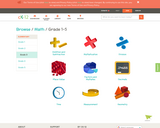
CK-12's Elementary Math Grade 3 is a series of videos and interactive videos designed to teach basic math concepts to 3rd graders. Concepts covered include Addition and Subtraction, Multiplication, Division, Place Value, Decimals, Time, Factors and Multiples, Money, Measurement, and Geometry.
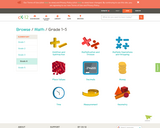
CK-12's Grade 4 Elementary Math is a series of videos and interactive videos designed to teach basic math concepts to 4th graders. Concepts covered include Addition and Subtraction, Multiplication and Division, Multiple Operations and Grouping, Place Value, Decimals, Time, Money, Measurement, and Geometry.
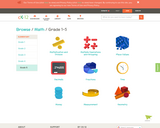
CK-12's Grade 5 Elementary Math is a series of videos and interactive videos designed to teach basic math concepts to 5th graders. Concepts covered include Multiplication and Division, Place Value, Multiple Operations and Grouping, Decimals, Time, Fractions, Money, Measurement, and Geometry.
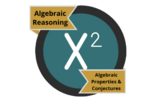
This microcredential represents a teacher’s ability to understand and respond to progressions related to algebraic properties and conjectures by planning and implementing instruction based on the Standards for Mathematical Practice and Effective Mathematics Teaching Practices. It involves selecting, using, and adapting mathematics curricula and teaching materials, including the integration of mathematical tools and technology, as well as using and analyzing formative and summative assessments to determine where students are in learning of algebraic properties and conjectures. This is the second of three microcredentials in the Elementary Mathematics Endorsement: Algebraic Reasoning Stack. These microcredentials can be earned in any order.

This microcredential represents a teacher’s ability to understand and respond to progressions related to Algebraic Notation, Equality, Inequality, and Relational Thinking by planning and implementing instruction based on the Standards for Mathematical Practice and Effective Mathematics Teaching Practices. This involves selecting, using, and adapting mathematics curricula and teaching materials, including the integration of mathematical tools and technology, as well as being able to use an analyze formative and summative assessments to determine where students are in learning of Algebraic Notation, Equality, Inequality, and Relational Thinking. This is the first of three microcredentials in the Elementary Mathematics Endorsement: Algebraic Reasoning Stack. These microcredentials can be earned in any order.

This microcredential represents a teacher’s understanding of patterns and their ability to understand and respond to progressions related to patterns by planning and implementing instruction based on the Standards for Mathematical Practice and Effective Mathematics Teaching Practices. It involves selecting, using, and adapting mathematics curricula and teaching materials, including the integration of mathematical tools and technology, as well as using formative and summative assessments to determine where students are in learning patterns. This is the third of three microcredentials in the Elementary Mathematics Endorsement: Algebraic Reasoning Stack. These microcredentials can be earned in any order.

This microcredential represents a teacher’s understanding of Multi-Tiered System of Supports (MTSS) and their ability to use MTSS at a classroom level. Effective use of MTSS involves gaining a deep assessment literacy, including being able to create, select, and effectively use classroom assessments, and being able to select and effectively interpret and use results from assessments (Kobett, B. M., & Wray, J. A., 2016). Additionally, MTSS involves understanding and implementing the critical components of the Utah Multi-Tiered System of Supports (UMTSS) Framework for Mathematics (i.e.., Team-based Problem Solving, High-quality Instruction, and Data-based Decision Making) and understanding and implementing effective intervention strategies. This microcredential is the first of two in the Elementary Mathematics Endorsement: Assessment and Intervention Stack. These microcredentials can be earned in any order.

This microcredential represents a teacher’s ability to implement equitable assessment practices. It shows an understanding of that fact that when access and equity have been successfully addressed, student outcomes—including achievement on a range of mathematics assessments, disposition toward mathematics, and persistence in the mathematics pipeline—transcend, and cannot be predicted by students' racial, ethnic, linguistic, gender, and socioeconomic backgrounds (NCTM, 2014. Access and equity in mathematics education). This microcredential is the second of two in the Elementary Mathematics Endorsement: Assessment and Intervention Stack. These microcredentials can be earned in any order.

This microcredential represents a teacher’s ability to understand and respond to progressions related to the coordinate plane by planning and implementing instruction based on the Standards for Mathematical Practice and Effective Mathematics Teaching Practices. It involves selecting, using, and adapting mathematics curricula and teaching materials, including the integration of mathematical tools and technology, as well as using and analyzing formative and summative assessments to determine students' understanding of the coordinate plane. This microcredential is the fourth of five in the Elementary Mathematics Endorsement: Understand and Implement Concepts of Measurement Stack. These microcredentials can be earned in any order.

This microcredential represents a teacher’s understanding of analyzing characteristics and properties of 2-D and 3-D figures. It involves their ability to understand and respond to progressions related to analyzing characteristics and properties of 2-D and 3-D figures by planning and implementing instruction based on the Standards for Mathematical Practice and Effective Mathematics Teaching Practices. It also includes the teacher's ability to select, use, and adapt mathematics curricula and teaching materials, including the integration of mathematical tools and technology, as well as using and analyzing formative and summative assessments to determine students' understanding of analyzing the characteristics and properties of 2-D and 3-D figures. This microcredential is the third of five in the Elementary Mathematics Endorsement: Understand and Implement Concepts of Measurement Stack. These microcredentials can be earned in any order.

This microcredential represents a teacher’s understanding of fluency and their ability to understand and support students in building procedural fluency from conceptual understanding over time. This includes planning and implementing instruction and assessment to support fluency in mathematics based on current fluency related research, as well as using and analyzing formative and summative assessments to determine where students are in building procedural fluency from conceptual understanding. This microcredential is the fifth of five in the Elementary Mathematics Endorsement: Numbers and Operations Stack. These microcredentials can be earned in any order.